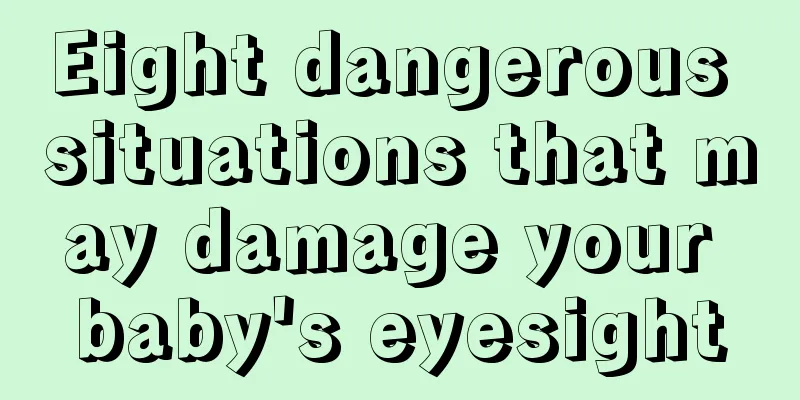Eight dangerous situations that may damage your baby's eyesight

|
Excessive eye mucus in newborns is a big problem. It can lead to diseases such as congenital dacryocystitis in newborns. If not treated in time, it will affect the vision development of newborns. Medical experts say that the reason for excessive eye mucus is that bacteria invade the lacrimal sac, multiply and fester in the lacrimal sac. The pus fills the entire lacrimal sac and cannot be excreted downwards, so it can only flow upward along the lacrimal sac and lacrimal canaliculi into the eyes. If not treated early, keratitis may occur, and the cornea may turn from black to white to form white spots, which will seriously affect the baby's vision development. Medical experts remind that after the baby is born, parents should pay special attention to the amount of eye mucus in his baby. If there is still eye mucus one week after birth, he should be taken to an ophthalmology hospital for examination as soon as possible. Case 2: Does hanging toys at the head of the bed affect the baby's early vision development? Indeed, many mothers like to tie a rope in the middle of their baby’s crib rails and hang some cute little toys on it. Because most babies are farsighted, if the toy is placed very close, they have to adjust their eyes hard to see it. Over time, the baby's eyes will rotate toward the center for a long time, and it may develop into esotropia. The correct way is to hang toys around the fence and change the position and direction of the toys frequently. In addition, when using toys to amuse your baby, do not place the toys too close to the eyes, otherwise it will affect the baby's vision development. Situation 3: Does the feeding posture affect the baby's eyes? It is best not to lie down for a long time or feed in the same posture when breastfeeding, because if you feed in a fixed position for a long time, the baby will often peek at the fixed light, which can easily cause strabismus. Some mothers like to cover their baby's eyes with a scarf or towel when the baby is sleeping or when they go out with the baby. Is this good? Infancy is the most sensitive period of visual development. If one eye is covered for a few days, it may cause permanent vision abnormalities in the covered eye, which is what doctors call "form deprivation amblyopia." Therefore, be sure not to cover your baby's eyes with objects at will. When taking your baby out, if the sunlight is too strong, you can temporarily cover it with a gauze scarf to avoid strong light irritating the baby's eyes. Situation 4: Should the light in the room be turned on when the baby is sleeping at night? Medical research shows that not turning off the lights when babies sleep will increase the possibility of children suffering from myopia. After studying 479 myopic patients aged 2-16, foreign medical researchers believe that the incidence of myopia in infants under two years old who sleep under the light is four times higher than that in infants who sleep in the dark. Only 10% of children who sleep in the dark suffer from myopia, while 34% of children who sleep under the light at night suffer from myopia, and 55% of children who sleep under strong indoor lighting suffer from myopia. Relevant experts pointed out that the first two years after birth are a critical stage for the development of the baby's eyes and focal adjustment functions. The amount of light and dark time may affect the development of the child's vision. Parents are advised to treat this with caution. Situation 5: When taking commemorative photos of my baby, can I use a flash? Nowadays, many parents do take photos of their babies frequently, but flash photography should not be used on infants and young children because the strong light from the flash can damage the retina. Case 6: In daily life, how to prevent baby from eye injuries? This requires extra caution from the whole family. For babies under 1 year old, parents should not give them any toys with sharp corners. When babies are about one year old, they can walk and run, so you should be more careful to prevent eye injuries at this time. Never give your baby sharp objects such as knives, scissors, needles, awls, bows and arrows, pencils, chopsticks, etc., to avoid the baby falling down due to unstable walking and getting injured in the eye by sharp objects. In addition, do not let your baby set off firecrackers by themselves during holidays, because they cannot master the technique. The huge external force when firecrackers explode and the violent impact on the eyeball can cause a series of eye injuries, such as rupture and burns of the eyelid skin and conjunctiva, multiple foreign bodies in the cornea and conjunctiva, corneal lacerations, anterior chamber and intraocular hemorrhage, fundus damage and glaucoma. In severe cases, complete blindness can occur. There are indeed many lessons to be learned. What should I do if detergents or other chemicals get into my baby's eyes? Will it have a big impact on my baby? There are many types of detergents and cleansers. No matter which one, most of them contain alkaline chemical components to varying degrees. If they accidentally enter the baby's eyes, they will damage the conjunctiva and corneal epithelium, causing conjunctival congestion and punctate or flaky damage to the corneal epithelium, affecting corneal transparency and making vision blurred. Due to the stimulation of the rich sensory nerve endings in the corneal epithelium, the baby will experience photophobia, tearing, fear of opening the eyes, and pain. So when using detergent, be sure not to splash it into your baby's eyes. If it happens, rinse immediately with clean water. Situation 7: What should I do if a foreign body such as sand gets into my baby's eyes? First aid measures: Generally, when foreign objects such as insects, dust, sand, iron filings, etc. enter the eyes, most of them stick to the surface of the eyeball. At this time, you should gently pinch the upper eyelid with your thumb and index finger and gently lift it forward. The rescuer should blow gently into the eye to stimulate tears and flush out the sand and dust. If this method does not work, let the child look up first, and the parents should use their fingers to gently pull open the lower eyelid to look for foreign objects. Special attention should be paid to the wrinkles where the lower eyelid and eyeball meet, as foreign objects are easily retained, so search carefully. If not, you can look for it by lifting up your upper eyelid, or by looking at the edge of the eyelid and the white of the eye. Once you find the foreign object, use a wet cotton swab or the corner of a clean handkerchief to gently remove it. When dust and sand adhere to the inner surface of the eyelids, you should turn the eyelids over and wipe them off. If a lot of sand and dust enters your eyes, rinse them with clean water. If lime particles are blown into the eyes, you should immediately open the eyelids, take out the lime particles, and then rinse with plenty of clean water. You can also soak the child's head in a basin, open and close the eyes repeatedly to wash away the foreign objects, and then send the child to the hospital immediately for treatment. Never send the child to the hospital without treatment. If a foreign body is embedded in the cornea, do not use sharp objects to pick it out at will to avoid penetrating the cornea. At this time, you can use a clean syringe to absorb boric acid water and gently rinse it around the foreign body, being careful not to rinse on the foreign body. If the foreign body still cannot be removed, go to the hospital for treatment as soon as possible. Precautions: When it is windy and sandy, it is best not to take children to play outdoors. When seeing dust rising, let your children close their eyes. Tip: When foreign objects enter your eyes, do not panic and do not rub your eyes with your hands. Rubbing with your hands or a handkerchief can damage the conjunctiva and cornea. Because foreign objects in the eyes may damage the fragile and sensitive cornea after being rubbed, causing corneal ulcers and infections, and affecting vision. Rubbing and squeezing can also cause eye congestion and conjunctival edema. At the same time, there are many bacteria on your hands, and rubbing your eyes will bring the bacteria into your eyes and cause inflammation. Note: If quicklime gets into your eyes, do not rub your eyes with your hands, and do not rinse them directly with water, because quicklime will produce alkaline slaked lime when it comes into contact with water, which will also generate heat. Improper handling may burn your eyes. Situation 8: If the baby's eyes develop abnormally, how can parents observe it? Under normal circumstances, the baby's eyes are bright and clear, the eyeballs are of moderate size, and they move freely. To observe whether there are any abnormalities in the baby's eye development, you can discover some problems as early as possible by looking at the size, shape, position, movement, color, etc. of the eyes. If the pupil turns white, it is usually due to "white cataract"; if there is white substance in the pupil area, the baby may have "cataract"; if the baby squints to see things, pay attention to whether the baby has myopia; if the eyeball becomes larger, it is usually due to "congenital glaucoma"; if the eyeball swings back and forth to the left and right (or up and down), it is due to "nystagmus"; if the eyeball tilts to one side, it means "strabismus"; if you put a toy in front of the baby and the baby is indifferent and does not pick it up, the baby probably has poor eyesight and may have "optic nerve atrophy" and other fundus diseases; if you find white reflective objects in the baby's pupils in the dark at night, like cat's eyes, you should consider "retinal cell tumor"; if the eyeball is protruding, especially if one eye is protruding, be alert to "retrobulbar tumor". |
<<: 3 major hazards caused by baby powder
>>: Pay attention to the eight "leaps" in baby's intelligence
Recommend
If your baby has diarrhea, be alert to these dangerous situations!
Many babies have weak resistance and poor immunit...
What causes itchy nose in children?
If you feel itchy inside your nose, you need to s...
How can I make the umbilical cord fall off quickly?
We all know that the connection channel between t...
Can I wash my baby's hair when he has a fever?
When the baby has a fever, parents will panic and...
Symptoms of language delay
We all know that language is an important means o...
What to do if your child has a headache and vomits
Children are always the center of every family, s...
Is it a problem if my baby has a fever of 37 degrees?
Nowadays, every child is the apple of the eye of ...
Causes and treatment of concealed penis in children
What kind of disease is concealed penis in childr...
What is the normal height and weight for a 12-month-old baby?
There was a survey that found that children are u...
Is swimming really good for young children?
Nowadays, after many babies are born, their paren...
Why can't the child speak?
After a child is born, he or she begins a long pr...
Is newborn hearing screening accurate?
Generally speaking, newborn hearing screening is ...
Why does an 8-year-old boy sweat when sleeping at night?
If a child sweats while sleeping at night, parent...
Uneven skin tone on children's faces
Children generally have weaker body resistance an...
Vaccinations required after the age of six
People need to get a lot of vaccines in their lif...









